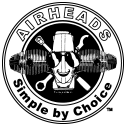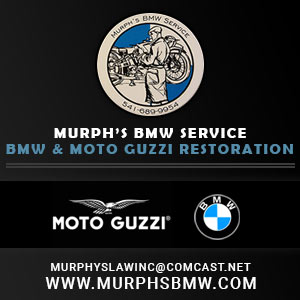New member intro and questions
New member here. Owned an R100/7 years ago and now have an R90/6 resto/mod project.
I would like to hear any opinions about how concerned I should be or what actions would be recommended for this particular issue.
Background:
76 R90/6 with unknown mileage
I bought the bike knowing it would be a project. Bike started easily, idled easily. I rode it around my neighborhood maybe 4-5 miles before tearing it down.
The left cylinder had lots of grime/ caked oil leak below the cylinder and around push rod seals.
upon removal of the left cylinder, I found that there had been internal damage at some point. Lots of scarring around cylinder mating surface, etc. I can not tell if the mating surface has been filled or welded, but it seems that there may still be enough quaking to allow oil seepage.
My question is what steps would you all take to remedy, knowing that I intend for this to be a high quality build?
my thoughts were:
A. Remove all engine internals and check specs, remove studs, check mating surface for flatness/ gauging with plate glass, resurface mating surface using glass/sandpaper
B. Source another block and transfer all parts
Any feedback is appreciated.
thanks
Justin
Hello Justin, welcome,
Looking at the picture, I am shocked to see this damage. Something happened in the bikes history either from the previous owner making a repair he didn't know how to do or just abuse.
Personally I would tear down and check everything carefully, spec out the crank, cam and such, find out what you have that is good and what is not. You would have to tear everything down anyway to swap to a new block.
As for this block, I am not a machinist, I do not know if the damage can be fixed or not. Perhaps contacting Max BMW's machine shop or looking in the Airheads reference section another airhead machine shop could give you a better idea to go with?
There is nothing inherently wrong with resurfacing as long as you know how and what you are doing and have the proper tools at hand.
Tearing down and checking stuff is cheap, LOL, if you do the work. If you have to have someone else do it, then cost might be high.
Yeah, not a lot of information, sorry, good luck, St.
Beware! I do not suffer fools gladly! St.
Thanks for the response Steven. As soon as I am done mocking up the bike with new wiring harness, I will be stripping it all down and dismantling the motor. At that point, swapping to a better condition block may be the easier solution.
That damage is a real head scratcher. It must have occurred with the cylinder removed, to expose that surface. Is there a corresponding mark on the connecting rod? If you position the crank at BOTTOM dead center, does the connecting rod lay in the big mark? Looks like someone doing some serious prying or hammering for some reason.
Just curious, are you making your own wiring harness or just replacing it? EME has new wiring harnesses available for most bikes. St.
Beware! I do not suffer fools gladly! St.
I agree, David. Puzzling for sure. My thought was some sort of piston/ rod damage and then some ham-fisted repair work.
I haven’t found marks on the rod, but base of the cylinder sleeve is marred quite a bit.
I am making my own wiring harness and using a motogadget mo.unit. I have a tendency to snowball projects and this has been no exception. I am now on the fools journey of building my ultimate airhead.
Not sure if attaching a video will work.
sneak peak of finished handle controls wiring.
Welcome Aboard !
Although the evidence inside the engine is puzzling, I don't think it warrants any special steps... and especially not any further disassembly. Your bike is nearing 50 years old, and this is what's inside a lot of 50 year old motorcycles.
If forced to venture a guess... it looks like someone had the cylinder(s) off, and another person stupidly pressed the electric start button. Some friends are just "helpful" like that.
You stated that the bike ran good for your short ride. So what is it that you expect to cure or fix by opening up the engine any further ? Oil leaks around the push rod tube seals is standard equipment on older Airheads. In my humble opinion, the engine should be reassembled and ridden. The only thing you will accomplish by a full tare down is spending a BIG pile of money simply to get a better view.
So I suggest re-assembly, with possibly more care than usual as to the prep and condition of the gasket surfaces. If you just "had to" spend an extra $2000, then I'd use it to buy a second complete short block and install that.
Instead, spend your time and money doing something really constrictive, like replacing the cam chain/ guides/ guide spring, installing EI and checking the condition of the oil by-pass valve.
All the best.
Owning an old Airhead is easy.
Keeping an old Airhead running great is the true test.
Richard adds a lot of good advice here. After reading it, I will change my advice and recommend following his advice.
As for the Motogadget unit, my friend built a custom scrambler for a customer and used one. Good luck, St.
Beware! I do not suffer fools gladly! St.
I am curious about “base of the cylinder sleeve is quite marred”.
I do agree - as long as the mating cylinder to block mating surfaces are in good shape, the engine should go together ok.
I wonder if the damage on the block was made by bumping the starter (like Richard suggested) with a tool (long bit) inserted in the lower connecting rod bolt.
If you do not tear the engine down further, you might consider new connecting rod bearing shells and new bolts.
Thank you all for the input.
Richard, I would definitely heed your advice to reassemble and ride if this were anywhere near a complete bike. I bought this bike with the intention of a project; it has just gone a little further than I originally planned. No slowing down now.
I admit that some of my original motivation for complete engine disassembly was purely aesthetic. I wanted to vapor blast all of the engine components to have a uniform finish.
I guess maybe a better question to ask would have been this:
When I got the bike, the area below the left cylinder was completely caked with oil/ grime all the way up to and including the cylinder base. I would have assumed this was just from the push rod seals, but after removing the cylinder, I noticed the marring and divots at the cylinder mating surface. Would anyone with more airhead experience than I expect that this could be a source of the oil seepage?
my goal is for this to be a high level custom build. I would hate to skip something now, only to have to address it after the bike is complete.
Justin, I myself believe some of the oil seepage is coming from the damaged cylinder. I agree with Richard to some point but at the same time I myself would check with an airhead friendly machine shop to see if the damage can be repaired. LOL, the only shop I can think of now is Max BMW. I am sure in the airheads website there is a list of others.
Yeah, you could put it all back together and not have a problem. Or, it could leak. I am sure it would not take long for any seepage to make itself known.
At least, you can do the work keeping the cost down.
Buying a replacement engine opens up the issue of is it infected with previous owner's disease? We can't see into engines to tell if there are bad or worn bearings. One of the riders here bought an engine to build a project and despite being told it had low miles turned out to have bad bearings.
Good luck, sorry I can't help more. St
Beware! I do not suffer fools gladly! St.
The problem here is that you have unintentionally "shot yourself in the foot". When you have a leak like this, the first thing to do is wash the area fully, then go ride the bike. If you can't see the source of the leak, then dust it with white powder (like flour) because the oil may be clear and nearly invisible... but it's there.
The problem you're fighting is wind. When you ride the bike, the passing air does not flow from front-to-rear in perfect straight lines. (Forget about all those movies you've seen of airplanes and F1 cars in wind tunnels, because that is not your situation.) No sir, the air under the cylinder is turbulent. That is to say it's going in every conceivable direction as soon as it hits the push rod tubes. So it's entirely within reason that oil from the PRT Seals is pushed upward onto the bottom of the cylinder base, where due to the surface irregularities, it may tend to linger and "cake up" over time.
It's unfortunate that the connecting rod seems to have slapped the engine case. But that surface is not the sealing gasket surface. From the photos you supplied I see no issues with removing the old gasket, and installing new BMW brand gaskets, O-rings and PRT seals. And then riding the bike.
As far as the vapor blasting... for my money you'll get a lot further with a stringent detergent, like Purple Power, or a very strong (slightly acidic) mag wheel cleaner. You can spray the assembled engine, let it sit for 5 min, and then pressure rinse and get the exact same look/ effect for hundreds of dollars less and hundreds of labor hours saved.
What the YouTube 'experts' don't tell you is that 2 weeks after you spend all this extra money and time (when you could have been riding), your engine will look exactly the same as my suggestions. What you'll learn is that YouTube and internet 'experts' are really only expert at spending other people's money.
"If it ain't broke, then don't fix it" applies here.
Hope this helps.
Owning an old Airhead is easy.
Keeping an old Airhead running great is the true test.
- 27 Forums
- 1,922 Topics
- 10.9 K Posts
- 3 Online
- 6,016 Members





